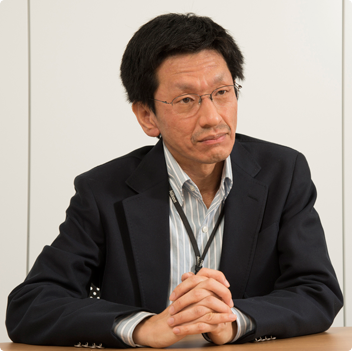Supporters of Nikon's optical technologies
Optical technology troubleshooters.

Please tell us about your department.
Basically, it can be considered as the "anchor" for optical technologies utilized at Nikon.
Could you elaborate on that?
While developing new products and technologies at Nikon, engineers and researchers often encounter difficult problems in the optical field. This is when they contact us for help. Our laboratory is divided into several sections specializing in the products of a particular company in the group or in charge of particular technologies. But my section is in charge of matters concerning Nikon's overall optical technologies. To be more specific, I would say we are experts of optical imaging*1 technologies.
Could you give an example of a problem that you dealt with?
Once, at Nikon (Thailand) Co., Ltd., the MTF (Modulation Transfer Function) test equipment*2 installed on production lines of interchangeable lenses for SLR cameras was malfunctioning with causes unknown. Since we couldn't discover the reason this was happening when we looked into it during the onsite investigation, we brought the data back to Japan. After thorough investigation, we realized that problems in the illumination system were causing the malfunction and remedied the situation.
Problems brought in for us to handle are diverse, although most of them are related to IC steppers and scanners. As long as the matter is related to optical imaging, we work on finding the appropriate solution, regardless of the field, in cooperation with onsite engineers.
- *1Optical imaging: Achieving an image through optics such as a lens. Ideal images should have no blur, in general terms.
- *2MTF test equipment: One of the devices that evaluate camera lens performance. It measures how accurately a lens reproduces the darkness and brightness of monochrome stripes.
The continuous challenge of unprecedented projects.
You have continually studied optics since you were in college, we hear.
I have studied the field of optics and metrology throughout my undergraduate, master's and doctoral programs. Studying under professors Shigeo Minami and Satoshi Kawata, two giants of Japan's applied physics, had a great impact on me. Professor Minami received the Order of the Sacred Treasure, Gold Rays with Neck Ribbon in 2010 and Professor Kawata received the Medal of Honor with Purple Ribbon in 2007, from the Japanese government, by the way.
It seems that you were already involved with Nikon's manufacturing when you were at graduate school.
During my doctoral program, I placed a special order to Nikon for a microscope to be used as our experimental equipment. I was not directly involved in the manufacturing process, but I wrote detailed specifications and commissioned its development.
What kind of microscope was that?
We called it a laser CT microscope, that utilizes a unique image formation property produced by special illumination as well as computer image processing. It can observe the three-dimensional structure of a specimen without slicing it. The design combined a multicolor laser, an illumination system, imaging optics and an electronic control system, and I believe it was the first in the world to be developed with such specifications. Nikon engineers and I spent a year working together to develop it. One of them is now the head of the Core Technology Center.
Then later, you joined Nikon.
Back then, the usual path for doctoral program graduates was to find employment at a university or national research institution. But I've always liked to do things differently from others, being rather individualistic. So I thought, "I should try to get a job at a manufacturer, maybe at an optical manufacturer so that I can make good use of my studies." That's how I came to work at Nikon.
You trailblazed a new career path for younger members of your department.
I was the first Ph.D. student in my department to join a private company after the program. I have talked to my younger colleagues about the excitement I feel in a manufacturing industry and some of them have since followed in my footsteps to enter the private sector.
Did joining Nikon make any difference to the impression you had of the company?
Not really. My impression of Nikon has always been that it is a diligent company that produces quality products supported by its strong technologies. Joining the team didn't change that. Every member of staff is very serious about the job.
